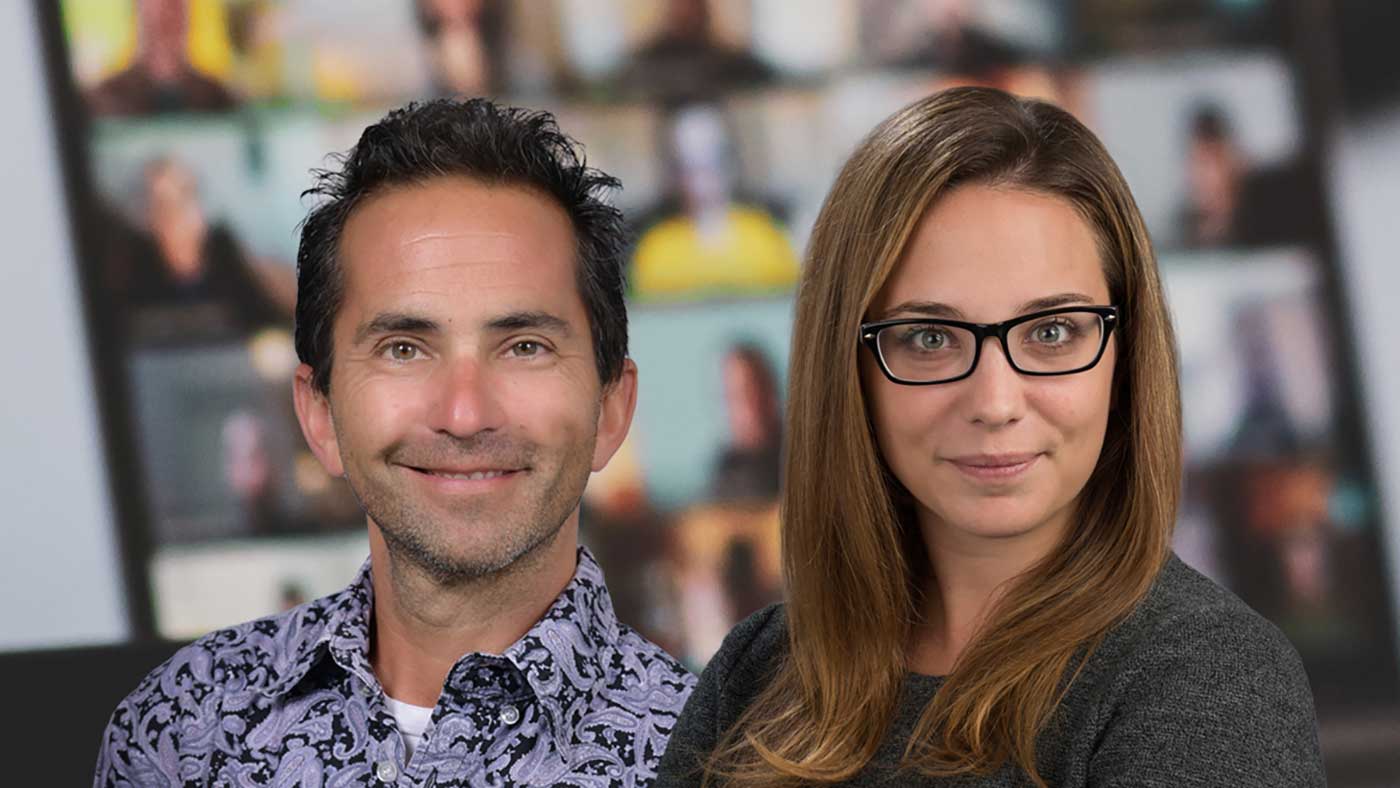
By:
- Christine Clark
Published Date
By:
- Christine Clark
Share This:

Faculty Start-Up Helps Employers Adapt to the Remote and Hybrid Work Era
School of Global Policy and Strategy’s Joshua Graff Zivin and Elizabeth Lyons innovate remote labor forces
With remote and hybrid work becoming a new norm, managers and employers around the world are presented with new challenges. However, for two faculty at UC San Diego’s School of Global Policy and Strategy, Joshua Graff Zivin and Elizabeth Lyons, it also presents an opportunity to adapt to a new era that can result in increased productivity and employee satisfaction.
When offices shuttered in 2020 due to the COVID-19 pandemic, Graff Zivin and Lyons predicted that workplaces would never be the same, so they decided to apply their expertise in economics, management and innovation to help employers capture the benefits and manage the barriers to successful remote and hybrid workplaces by creating Amplisal. The startup combines the founders’ research and expertise with data science and machine learning to help firms better manage, recruit and retain workforces in the remote work era.
The company is unique in its individualized, data-driven approach, which is much needed for many companies that had to rapidly transition to new work arrangements.
“What we have found is going remote has been much less dramatic for workers than it has been for managers,” Graff Zivin said. “Workers are pretty much doing what they were doing before the pandemic, except now there may be screaming kids in the background or barking dogs, whereas for managers, they want to interact with their team and motivate them with office drop-ins or ‘walking the halls.’ There is no obvious parallel to that in a world in which your workers are, in some cases, spread across the country or globe and tethered to a computer.”
The challenges managers face with remote work was the center of a recent op-ed from Graff Zivin and Lyons published in Fast Company. In the piece, the two argue that managers should adapt and utilize new tools to manage fully remote and hybrid workforces. And this is exactly what their work for Amplisal does: it tailors recommendations for companies to reinvent many management aspects that in-person work afforded.
In addition to the respective expertise of Graff Zivin, a professor of economics, and Lyons, an associate professor of management, the company utilizes machine learning and data science to solve the barriers to successful remote work. Aaron Fraenkel, assistant teaching professor at the Halıcıoğlu Data Science Institute, serves as Amplisal’s chief technology officer.
Amplisal leverages their QuitCastTM software program to gauge employee satisfaction, which helps with retention efforts.
“It can be easy for remote workers to feel disconnected, which may incentivize them to leave because they don't have the close relationships with their team that they did when they were in person,” Lyons said. “We utilize this tool to get honest and anonymous answers from employees to help managers reduce risks of losing staff and hopefully increase the job satisfaction of employees.”
They also employ human resources program diagnostics that help provide an overall assessment of how remote and hybrid work is being set up and managed within firms. This helps Graff Zivin and Lyons develop recruitment strategies for firms. In addition, they use spatial data to show employers the locations from which they should hire.
“Hiring in all 50 states is very expensive from an HR perspective because each state has different regulations,” Lyons said. “So, we help employers understand where to locate their hiring efforts, based on what type of worker they're looking for and what type of salaries they're able to pay.”
Remote workers are productive, many like hybrid arrangements and flex schedules are key to employee satisfaction
Graff Zivin and Lyons have noticed some salient trends with their experience working with businesses through Amplisal. In addition to remote work often being more challenging for managers than it is employees, they’ve noticed that many employees value flexible hours above all else.
“Being able to go into the office at times it fits with your personal schedule is a big priority for employees, including those with hybrid schedules,” Graff Zivin said. “Flex schedules allow employees to perform some work at home and also get a lot of interaction in the office.”
Also, roughly as many employees prefer hybrid schedules as those who prefer being fully remote. “While there are a lot of headlines about employees never wanting to go back in the office, we are seeing that is often untrue,” Lyons said. “Workers value three remote days per week as much as they do four and not much more than they value two.”
Crucially, productivity does not suffer with remote work—and this is especially true for those who prefer flex schedules.
“There's this false notion that if you were sitting at your desk, you were being productive, even though you might have been online shopping or staring out the window or chewing on your pencil and thinking about what you're going to do for the weekend,” Graff Zivin said. “If you were sitting there, your manager could count that as productive and if that's your measure of productivity, it's no wonder that the remote world is really scary because managers can't count the hours anymore.”
He added, “managers need to get much cleverer and more sophisticated about how to evaluate performance and evaluate outputs, not input. It makes the manager’s jobs harder because they have to reinvent the performance rubric in ways that are better connected to firm productivity and profitability.”
The biggest risk with remote work is a lack of connectivity that remote workers may feel with their employer.
Lyons added that managers must get creative with how to overcome this barrier; however, even something as simple as regular check-ins with employees has been shown to help and they also increase productivity.
“I would say our company is very true to the GPS spirit,” Graff Zivin said. “Our faculty are interested in life beyond the ‘ivory tower.’ They advise presidents and senators and we all like to apply our research to the real world. The real world is complicated and messy, and that’s how we can shape the best policy recommendations—from tangible collaborations with firms, governments and various organizations.”
Lyons added that she was excited to co-found a startup after years of advising startups and teaching GPS students how to create their own startups.
“One of the most gratifying aspects of founding this company has been working with my co-founders, including our Chief Financial Officer, Sean Walsh, who is one of my former startup class students.”
Walsh earned his Master of International Affairs from GPS in 2018.
To learn more about Amplisal, go to the company’s website.
Share This:
You May Also Like
Stay in the Know
Keep up with all the latest from UC San Diego. Subscribe to the newsletter today.


